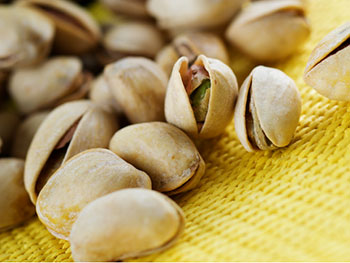More Health and Nutrition Bites
Health & Nutrition Bites
Get the latest health and diet news - along with what you can do about it - sent to your Inbox once a week. Get Dr. Gourmet's Health and Nutrition Bites sent to you via email. Sign up now!
What's the best nut for your blood pressure?

I've talked about nuts quite a bit here at DrGourmet.com. Not only are nuts part of the Mediterranean Diet, there's been quite a bit of research on nuts themselves, not to mention research into specific types of nuts, including walnuts, pistachios, and almonds. Adding nuts to your diet has been associated with reducing your risk of type 2 diabetes (even without losing weight!), improving your cholesterol scores, and reducing your risk of death from any cause.
Eating nuts has also been associated with a lower risk of high blood pressure along with heart disease risk factors like diabetes and poor cholesterol scores. In an effort to link nut intake directly to blood pressure, an international team of researchers performed a meta-analysis of multiple studies that looked at nut consumption and also reported on the participants' blood pressures (Am J Clin Nutr 2015;101:966-82).
The 21 studies they included in their analysis were all randomized controlled trials (the gold standard of clinical research), specifically focused on the effects of consuming single or mixed nuts on systolic blood pressure (the top number in a reading) or diastolic blood pressure (the bottom number), and included adults 18 or over. For the purposes of their research the scientists included walnuts, almonds, pistachios, cashews, hazelnuts, macadamia nuts, pecans, peanuts, and soy nuts in their definition of nuts, even though technically peanuts and soy nuts are legumes.
The pooled results included 1,652 men and women between the ages of 18 and 86 from studies that lasted anywhere from 2 to 16 weeks.
They found, somewhat surprisingly, that almonds, walnuts, cashews, peanuts, and soy nuts, when considered by themselves or as part of "mixed nuts," had no significant effect on systolic blood pressure.
Pistachios, however, seemed to help reduce both systolic and diastolic blood pressures in amounts that can be considered clinically significant: as much as 3 points lower for systolic blood pressure and 2 points lower for diastolic blood pressure.
What this means for you
The authors note that the preparation of the nuts varied across the different source studies: some were roasted with oil, some dry-roasted, some salted, etc. That may have an effect on the results. What you can be sure of is that nuts are great for you - and pistachios may be best, at least for your blood pressure. That doesn't mean, however, that you can throw away your blood pressure medication in favor of a daily handful (or two) of nuts. Make nuts your snack of choice along with your doctor's recommendations and a healthy diet.
First posted: May 27, 2015
